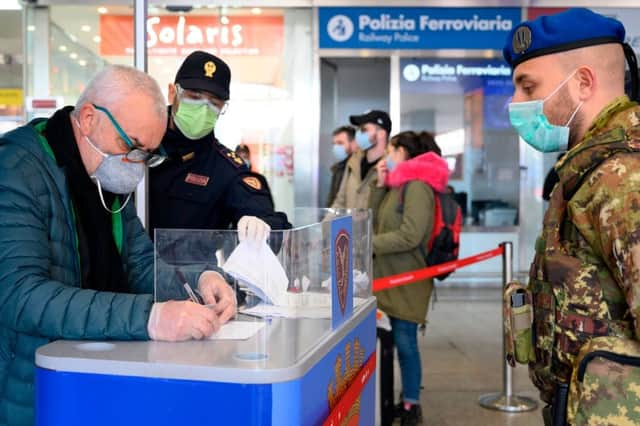Here's what to do if you have a holiday to Italy booked


The Foreign and Commonwealth Office have advised against “all but essential” travel to Italy after the entire country was placed on lockdown due to the outbreak of coronavirus Covid-19.
In a statement on Monday night (March 9) prime minister Giuseppe Conte told all Italian’s to “stay at home” and banned all public gatherings.
Advertisement
Hide AdAdvertisement
Hide AdThe extreme measures come as Italy struggles to contain the novel coronavirus Covid-19 which has claimed the lives of 463 citizens – the most outside of China.
A popular tourist destination, the measures have also seen the country sealed off to tourists.
Here’s what you need to know if your holiday plans have been affected by the lockdown.
What should I do if I am already in Italy?
It is estimated that there are between 30,000 and 40,000 British citizens already in Italy on a temporary basis.
Advertisement
Hide AdAdvertisement
Hide AdThe FCO have advised: “British nationals remain able to depart Italy without restriction. Airports remain open throughout Italy.
“However, airline schedules are subject to change and some flights are being cancelled. Travellers are advised to check flight details with airlines.”
British airlines Easyjet and British Airways appear to have cancelled all their flights to and from Italy, while irish airline Ryanair are running a limited schedule in an attempt to repatriate affected travellers.
The situation with airlines is changing by the hour and stranded travellers may be better suited to exit the country via long-distance rail which is currently operating a near-regular schedule. Once exited travellers can book a flight from southern France, or Switzerland.
Advertisement
Hide AdAdvertisement
Hide AdIf your flight operator runs a service from your alternative departure city, ask if you can be flown home.
Am I due a refund?
If your holiday is scheduled up to early April and has been cancelled you may be eligible to a refund.
If you booked a package holiday you are owed a full refund within two weeks.
Flights booked separately should also be refunded fairly swiftly if the carrier has been unable to run your booked flight.
Advertisement
Hide AdAdvertisement
Hide AdHotel bookings will depend on the policy of the company, but any costs not recouped can be covered by a travel insurance policy featuring “travel disruption cover”.
If your insurance does not feature this then you may struggle to recoup hotel and car hire costs.
I am booked to visit Italy in the coming weeks, can I go?
Travellers should avoid visiting Italy so long as the FCO’s “all but essential” travel advice is in place.
Holidaymakers should look to secure their refund and consider travelling elsewhere.
Advertisement
Hide AdAdvertisement
Hide AdAm I due a refund if I cancel my holiday?
Italy is a popular destination over the Easter period and many travellers will be fretting over whether to cancel already booked plans then and beyond.
If you decide to cancel a trip to Italy that is at your discretion. But it would be considered a “disinclination to travel” by travel providers or insurers and you would be responsible for the cost.
If you are concerned to the point of wanting to cancel a trip to a destination the FCO does not advise against travelling to, it could be worth considering a change fee to postpone until a later date.
Coronavirus: the facts
What is coronavirus?
COVID-19 is a respiratory illness that can affect lungs and airways. It is caused by a virus called coronavirus.
What caused coronavirus?
Advertisement
Hide AdAdvertisement
Hide AdThe outbreak started in Wuhan in China in December 2019 and it is thought that the virus, like others of its kind, has come from animals.
How is it spread?
As this is such a new illness, experts still aren’t sure how it is spread. But.similar viruses are spread in cough droplets. Therefore covering your nose and mouth when sneezing and coughing, and disposing of used tissues straight away is advised. Viruses like coronavirus cannot live outside the body for very long.
What are the symptoms?
The NHS states that the symptoms are: a dry cough, high temperature and shortness of breath - but these symptoms do not necessarily mean you have the illness. Look out for flu-like symptoms, such as aches and pains, nasal congestion, runny nose and a sore throat. It’s important to remember that some people may become infected but won’t develop any symptoms or feel unwell.
What precautions can be taken?
Washing your hands with soap and water thoroughly. The NHS also advises to cover your mouth and nose with a tissue or your sleeve (not your hands) when you cough or sneeze; put used tissues in the bin immediately and try to avoid close contact with people who are unwell. Also avoiding touching eyes, nose and mouth unless your hands are clean.
Should I avoid public places?
Advertisement
Hide AdAdvertisement
Hide AdMost people who feel well can continue to go to work, school and public places and should only stay at home and self isolate if advised by a medical professional or the coronavirus service.
What should I do if I feel unwell?
Don’t go to your GP but instead call NHS 111 or look online at the coronavirus service that can tell you if you need medical help and what to do next.
When to call NHS 111
NHS 111 should be used if you feel unwell with coronavirus symptoms, have been in a country with a high risk of coronavirus in the last 14 days or if you have been in close contact with someone with the virus.